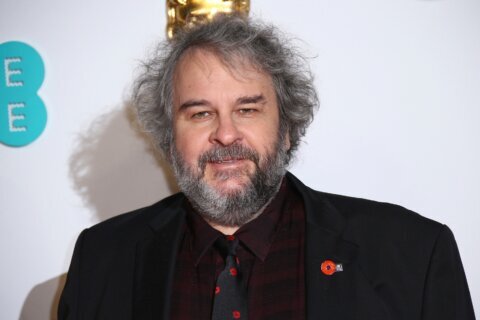Hear our full conversation on my podcast “Beyond the Fame.”
He was inducted into the Rock & Roll Hall of Fame as the former lead guitarist of Genesis.
On April 13, Steve Hackett hits Warner Theatre with his “Seconds Out + More Tour,” featuring a solo set, then a recreation of Genesis’ full live album “Seconds Out” (1977).
“We do a couple of things from ‘Surrender of Silence,’ ‘Spectral Mornings’ … about 30-40 minutes of that, then put on the Genesis hat and do the whole ‘Seconds Out,’ including ‘Supper’s Ready,’ ‘Cinema Show’ and ‘Firth of Fifth,'” Hackett told WTOP. “There’s a break in the middle, 15-20 minutes for people to powder their nose, get hammered at the bar.”
Born in London in 1950, Hackett was exposed to music at a very early age.
“My dad played a lot of instruments,” Hackett said. “From the age of 2, I was trying to play the harmonica. … Early influences: cowboy tunes, Davy Crockett, then there was a bit of opera, Mario Lanza, Glenn Miller, Elvis, then The Shadows came along and that’s when I first heard electric guitar. The rest is history. I took up electric guitar at age 14.”
In 1970, he placed an ad in Melody Maker magazine seeking a band, reading, “Imaginative guitarist/writer seeks involvement with receptive musicians, determined to strive beyond existing stagnant musical forms.” Peter Gabriel read it and invited him to join Genesis.
“Peter Gabriel realized I was either completely crazy or another idealist,” Hackett said. “It sounded like Winston Churchill does rock! ‘We will fight them on the beaches, on the frets!’ … He was as crazy as I was, so we worked well together for a number of years.”
The lineup was Gabriel (lead vocals), Phil Collins (drums), Tony Banks (keys), Mike Rutherford (bass) and Hackett, lead guitarist from 1971-1977 across six studio albums.
Hackett’s first album with Genesis was “Nursery Cryme” (1971) where he invented a two-handed tapping style on the guitar that later influenced Eddie Van Halen and Brian May.
“I was trying to work out something to play on a track called ‘[The] Musical Box’ … using tapping on that, then there was a track, ‘The Return of the Giant Hogweed,’ that had a tapping intro,” Hackett said. “I was grateful to J.S. Bach, who was born in 1685, but I was trying to play a line from ‘Toccata and Fugue’ and felt the easiest thing was to play it on one string!”
Their next album, “Foxtrot” (1972), featured the epic length of “Supper’s Ready.”
“It’s the band’s longest recorded song,” Hackett said. “I do an even longer version because I do a long guitar solo at the end. The original is something in excess of 22 minutes and mine sometimes goes up to 25 minutes. That’s what happens when you’re having fun with guitars! … ‘Supper’s Ready’ was an idea I had … a musical odyssey to get lost in.”
His third album with Genesis was “Selling England by the Pound” (1973), a No. 3 album in the UK, including his signature guitar solo in the fan-favorite song “Firth of Fifth.”
“The song was already written by Tony Banks,” Hackett said. “The melody he originally played was on piano. … I said, ‘How about I do it on guitar?’ I made it sound a little more Eastern, there was something Indian about the scale when you start to bend notes. … I said, ‘If we do it like this with Mellotron, it’ll serve the melody more than acoustic.'”
Indeed, the Mellotron added a completely different sound to Genesis.
“The Beatles used it famously on the introduction of ‘Strawberry Fields [Forever],'” Hackett said. “I remember seeing King Crimson and Moody Blues using a Mellotron live. It sounded stunning live. I knew I had to work with a Mellotron. For my first six months with Genesis, we didn’t have [one]. ‘We’ve gotta get one of these things.'”
Their next album, “The Lamb Lies Down on Broadway” (1974), would be Gabriel’s last.
“Pete never believed in the idea of composition by committee,” Hackett said. “He wanted to write his own stuff. … Pete was always headed toward a solo career. I think you can hear the competition, the clash of horns between Pete and Tony, very busy keyboard passages and very busy lyrical passages. … It’s more of a wrestling match than an album.”
Collins became lead vocalist on the next album “A Trick of the Tail” (1976).
“One of the first things that I wrote with Phil was ‘For Absent Friends,’ and he was the one who sang it, but his voice was sufficiently similar to Peter, so no one realized Phil was doing it,” Hackett said. “He had a good voice, no doubt about it, but I don’t think anyone realized at that time what a global superstar he was to become.”
Hackett would record one final album with Genesis called “Wind & Wuthering” (1976), featuring the band’s first charting hit in the U.S. with “Your Own Special Way.”
“I did a solo album when I was still a part of the band; Mike and Phil were on it,” Hackett said. “The album started to take off in the interim after Pete left and no one really knew the band’s future. … I was told either you can’t do any more solo albums or you’ve got to leave the band. … I didn’t want to be told what to do. My allegiance is to music itself.”
Genesis’ next album referenced his departure, “And Then There Were Three,” featuring the hit song “Follow You Follow Me.” It was the first of many Collins-fronted hits: “That’s All,” “Invisible Touch,” “Throwing It All Away,” “In Too Deep,” “Land of Confusion,” “Tonight Tonight Tonight” and “I Can’t Dance,” not to mention solo work like “In the Air Tonight.”
What’s Hackett’s favorite song released by Genesis after his departure?
“I quite like ‘Abacab,'” Hackett said. “I would have done a guitar solo on it.”
No matter, Hackett was busy rattling off 27 studio albums of his own, as well as forming the rock supergroup GTR with former Yes lead guitarist Steve Howe.
“There have been many more if you count all the live ones,” Hackett said. “I’ve lost count of the amount of albums I’ve shown up on of other people’s, it must be hundreds by now.”
Which of Hackett’s solo albums should we pick up en route to Warner Theatre?
“There’s ‘Spectral Mornings,’ those songs work very well live,” Hackett said. “There’s also ‘Surrender of Silence,’ the most recent album, which I’m very fond of, particularly the orchestral work. You get orchestral metal. It’s part of what I do, seeing a band live and thinking, ‘I think I’m watching an orchestra, but it’s coming at me like sheet metal.'”
In 1996, Hackett released his throwback album “Genesis Revisited” before being inducted into the Rock & Roll Hall of Fame beside his former Genesis bandmates in 2010.
“It’s great that the early work was celebrated in that way,” Hackett said. “It’s a great institution, the Rock & Roll Hall of Fame, no doubt about it. I wish we had something like that in England. … Genesis is saying, ‘These are our last concerts. That’s it,’ then they hang up their spurs. I’m just getting going because I want these songs to be played.”
Hear our full conversation on my podcast “Beyond the Fame.”








